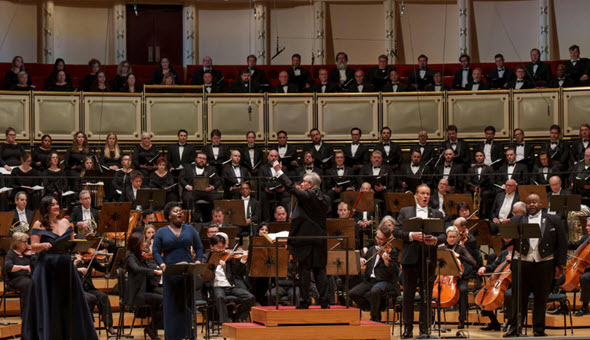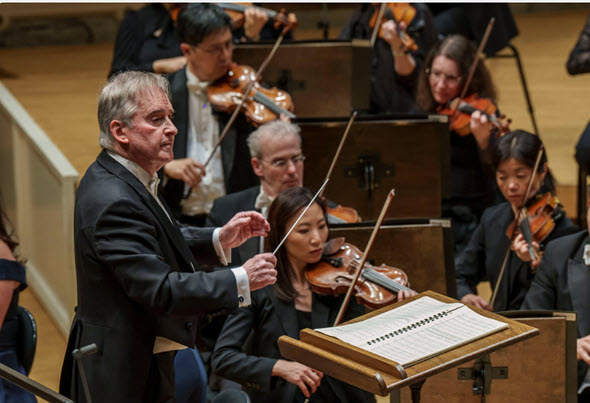CSO and Chorus offer Mendelssohn’s ‘Elijah’: Polished sound, but scant fury, signifying little

James Conlon conducted the Chicago Symphony Orchestra and Chorus in Mendelssohn’s ‘Elijah.’ (Todd Rosenberg photos)
Review: Chicago Symphony Orchestra and Chorus, with five vocal soloists, conducted by James Conlon at Orchestra Hall.
By Lawrence B. Johnson
There’s an old quip about Felix Mendelssohn that he began as a genius and ended up very talented. Near that end, in 1846, Mendelssohn composed his oratorio “Elijah,” drawing on Old Testament texts about the 9th-century B.C. prophet who railed against the deification of Baal and won his case by demonstrating the authenticity of Yaweh — or God in common Judeo-Christian parlance.
One might reasonably argue that “Elijah” is a virtually perfect musical composition — impeccable, to invoke a term with apt etymological roots. One might also observe that if the work is musically unblemished, it is also dramatically and psychologically unshadowed. Moreover, it is as rigorously unoriginal as it is conceptually unchallenging, a paragon of Victorian moral complacency: a Sunday school lesson that requires nothing of the listener but attendance and ready subscription.
Under the baton of James Conlon, the Chicago Symphony Orchestra and Chorus presented “Elijah” in performances April 11-13, of which I heard the last. Like the oratorio on its surface, which is to say in its entirety, what I heard was altogether above reproach. The only question was why it was undertaken at all.
No doubt “Elijah” is a great pleasure to sing, for the chorus and for the four (or four and a half) vocal soloists — here, the splendid group of soprano Masabane Cecilia Rangwanasha, mezzo-soprano Ashley Dixon, tenor Issachah Savage and, in the title role and especially rewarding, baritone Lucas Meacham. The “half” is almost literally that, a child who serves as Elijah’s lookout for a sign of Yaweh’s approach. Ten-year-old Lincon Reed was the charming respondent from the lower balcony of Orchestra Hall. The CSO Chorus, prepared by guest director Eugene Rogers, sounded marvelous.
“Elijah” is a grand-scaled work, just under three hours including an intermission in this production, which makes it roughly the length of Handel’s “Messiah” uncut. Indeed, Mendelssohn’s consciousness of “Messiah” resonates everywhere in the choral structures, rhythms and harmonies of “Elijah.” Perhaps more keenly than any other composer of his time, Mendelssohn knew and relished the masterworks of both Handel and Bach. It was the 20-year-old Mendelssohn who resurrected Bach’s “St. Matthew Passion” and conducted its first performance since Bach’s death in 1750. And that was three years after Mendelssohn the youthful composer of Schubertian and Mozartian brilliance composed his vivacious and imaginative “A Midsummer Night’s Dream” music.
Ah, the operative word: imaginative. I don’t hear much imagination in “Elijah.” Extreme competence certainly, but more correctness than imagination. To find creative spark in religious works of major import, listen to the Requiems of Mozart, Berlioz and Verdi — to say nothing of Beethoven’s Missa Solemnis.
Mendelssohn’s “Elijah,” as the CSO performance amply illustrated, is a string of bright baubles, each one perfectly formed. In the decades and generations since the work’s premiere — in England, and in English, with the composer conducting — it has been hailed as an obvious masterpiece and dismissed as trivial. I find it to be glib, easy listening. without dramatic arc or emotional edge. Nowhere does one find the thrilling, charged counterpoint of Handel or Bach. The closest Mendelssohn comes to a fugue in “Elijah” are some brief choral canons that seem to fade as suddenly as they are formed.
What must be acknowledged as great is the role of Elijah himself. He is an intractable visionary, bent on expunging worship of the false god Baal and raising up his true Yaweh. When Mendelssohn’s Elijah speaks, you pay attention, and that was eminently so in the person and voice of Lucas Meacham, whose proclamations and imprecations rang with resolute authority.
To be sure, the audience at Orchestra Hall saluted the effort of Conlon and company with a rousing ovation, and why not? It was an altogether radiant performance, shining and majestic. But for what, really? A polished relic of another time, another world that was imaginary even in its own time.
Now that the Chicago Symphony has a new-generation music director-designate in Klaus Mäkelä, it’s time for the whole enterprise to move forward, to filter its legacy and present works that are not just a familiar pleasure to perform but essentially meaningful to hear.




